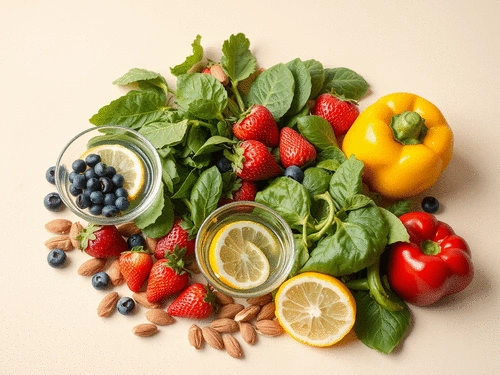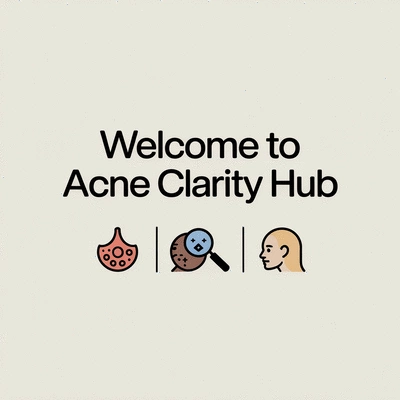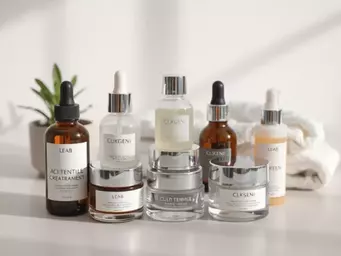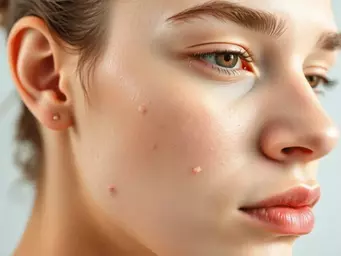What if the key to clearer skin lies not just in your skincare routine, but also in your diet? The connection between diet and acne is more significant than many realize, and understanding this relationship can empower you to make healthier choices for your skin's sake.
What You Will Learn
- Hormonal spikes from high-glycemic foods can lead to increased oil production, contributing to acne.
- Dairy products may exacerbate acne symptoms due to their insulin-spiking proteins.
- Fast foods and processed ingredients are rich in unhealthy fats and sugars, promoting inflammation and breakouts.
- Identifying and avoiding inflammatory foods can significantly improve skin health and clarity.
- Creating a personalized meal plan focused on nutrient-rich foods is essential for clearer skin.
- Long-term dietary changes, rather than quick fixes, are key to sustainable skin health improvements.
- Exploring plant-based diets can offer anti-inflammatory benefits that support better skin health.
- The Mediterranean diet, rich in healthy fats and diverse food sources, can positively impact skin appearance.
Dietary Factors Influencing Acne
This visual summarizes key dietary factors that can exacerbate or improve acne, categorized by food types and their physiological effects.
Foods to Avoid (Acne Triggers)
- ✖ High Glycemic Foods: Sugary snacks, white bread, sodas (rapid insulin spikes)
- ✖ Dairy Products: Milk, cheese, yogurt (hormonal responses, insulin-like growth factors)
- ✖ Fast Foods/Processed: Trans fats, refined sugars, additives (inflammation, oil production)
- ✖ Inflammatory Foods: Processed snacks, refined carbs (worsen existing conditions)
Diets for Clearer Skin (Acne Combatants)
- ✔ Personalized Meal Plan: Identify triggers, include nutrient-dense foods (e.g., whole grains, fish)
- ✔ Vegetarian/Vegan Diets: Rich in antioxidants, lower in dairy, increased fiber (reduced inflammation)
- ✔ Ketogenic Diet: Reduced sugar intake, potential hormonal balance (consult professional)
- ✔ Mediterranean Diet: Healthy fats (omega-3s), diverse foods, low processed foods (reduces inflammation)
Understanding the Connection Between Diet and Acne
Have you ever wondered how your favorite foods might be affecting your skin? The link between diet and acne is a fascinating area of research that highlights how what we eat can influence our skin health. Various biological mechanisms, including hormonal responses and inflammation pathways, play a significant role in this connection. For instance, certain foods can lead to increased insulin levels, prompting our bodies to produce more oil, which can clog pores and result in breakouts.
The foods we consume can also trigger inflammation within the body, exacerbating existing skin conditions. In fact, many patients I see at Acne Clarity Hub are surprised to learn how their daily diet can be a contributing factor to their acne issues. It's not just about how we care for our skin externally, but also about nourishing it from within!

How Diet Influences Skin Health and Acne
Understanding how diet impacts acne involves looking at several key factors:
- Hormonal Responses: Foods that cause spikes in insulin can lead to increased oil production.
- Inflammation Pathways: Diets high in sugar and unhealthy fats can heighten inflammation, worsening acne.
- Vitamin and Mineral Intake: Nutrient-rich foods support skin health, while deficiencies can lead to issues.
When we consume high-glycemic foods, like sugary snacks or refined carbohydrates, insulin levels rise quickly. This response not only fuels acne but can also lead to other skin issues, making it essential to pay attention to our dietary choices. A comprehensive review of the current evidence on the impact of diet on the development and treatment of acne vulgaris can be found in this recent study. At Acne Clarity Hub, we emphasize the importance of a balanced diet in achieving clearer skin!
Identifying Foods to Avoid for Clearer Skin
To achieve clearer skin, it's vital to recognize which foods may be contributing to your acne. For many individuals, certain dietary choices can lead to increased breakouts and skin inflammation. Let’s dive into some common culprits you might want to reconsider.
The Role of High Glycemic Foods in Acne Development
High glycemic foods, which cause a rapid increase in blood sugar levels, are often at the top of the list when discussing acne triggers. These include:
- Sugary snacks
- Sodas
- White bread and pastries
These foods can significantly impact your skin's health, as they can lead to more oil production and, ultimately, clogged pores. It’s worth being mindful of what you’re eating if you're struggling with acne!
Dairy Products and Their Impact on Acne
Another group of foods that may exacerbate acne are dairy products. Milk, cheese, and yogurt contain proteins like whey and casein, which can affect insulin levels. For some people, this can lead to increased oil production and a higher likelihood of breakouts. It's important to observe how your skin responds to dairy! If you notice more blemishes after enjoying a milkshake, it might be time to cut back. This connection is further explored in research on the role of dairy products in acne pathogenesis.
Fast Foods and Processed Ingredients: A Recipe for Skin Issues
Let’s talk about fast food. Many of the ingredients in typical fast-food items—think greasy burgers, fries, and sugary drinks—are often unhealthy and can contribute to inflammation. These foods are loaded with:
- Trans fats
- Refined sugars
- Unhealthy additives
Such ingredients can wreak havoc on your skin, leading to breakouts that feel impossible to control. By making more conscious food choices, you can take significant strides towards clearer skin! The FDA provides guidance on understanding nutrition labels, which can help in identifying processed ingredients.
Identifying Inflammatory Foods That Trigger Acne
Finally, let’s identify some common inflammatory foods that can worsen acne symptoms:
- Sugar and high-fructose corn syrup
- Processed snacks like chips and cookies
- Refined carbohydrates
These foods not only promote inflammation but can also lead to a cascade of other skin issues. So, if you’re looking to improve your complexion, consider taking a closer look at your diet. Remember, at Acne Clarity Hub, we’re here to guide you on your journey to clearer skin!
Frequently Asked Questions About Diet and Acne
Here are some common questions regarding the relationship between diet and acne:
- 1. Can certain foods directly cause acne?
- While no single food directly "causes" acne in everyone, certain foods, particularly high-glycemic foods, dairy products, fast foods, and processed ingredients, can exacerbate existing acne or trigger breakouts in susceptible individuals due to their effects on hormones and inflammation.
- 2. How do high-glycemic foods affect acne?
- High-glycemic foods cause a rapid increase in blood sugar levels, leading to an insulin spike. This can increase oil production in the skin and promote inflammation, both of which contribute to acne development.
- 3. Should I cut out dairy to improve my skin?
- Dairy products contain proteins like whey and casein that can affect insulin levels, potentially leading to increased oil production and breakouts in some individuals. It's recommended to observe your skin's response to dairy and consider reducing your intake if you notice a correlation with breakouts.
- 4. What are some effective dietary changes to combat acne?
- Effective dietary changes include identifying and avoiding personal trigger foods, creating a personalized meal plan rich in nutrient-dense foods (like whole grains, leafy greens, and fatty fish), staying hydrated, and focusing on long-term, sustainable habits.
- 5. Are vegetarian, vegan, or Mediterranean diets beneficial for acne?
- Yes, these diets can be beneficial. Vegetarian and vegan diets are often rich in antioxidants and fiber, and low in dairy, which can reduce inflammation. The Mediterranean diet, with its emphasis on healthy fats, diverse whole foods, and minimal processed ingredients, also helps reduce inflammation and supports overall skin health.
We Want to Hear From You!
What dietary changes have you noticed in your skin health? Share your experiences or any challenges you face while trying to manage acne through diet:
Practical Tips for Dietary Changes to Combat Acne
Making dietary changes can feel overwhelming, but with the right strategies, you can tackle acne while enjoying delicious foods. Let's dive into actionable tips that can guide you toward clearer skin. Creating a personalized meal plan is a great first step!
Creating a Personalized Meal Plan for Clear Skin
When it comes to your skin, a one-size-fits-all approach doesn’t work. Here’s how you can create a meal plan tailored to your skin's needs:
- Identify Trigger Foods: Start by listing foods that you suspect worsen your acne, like sugary snacks and dairy.
- Include Acne-Friendly Foods: Focus on nutrient-dense options. Think about adding whole grains, leafy greens, and fatty fish.
- Plan Balanced Meals: Aim for a mix of healthy fats, proteins, and carbohydrates in each meal. For example, combine quinoa with grilled vegetables and salmon.
- Stay Hydrated: Don’t forget water! Staying hydrated helps flush out toxins and supports overall skin health.
By incorporating these elements, you’ll be setting yourself up for skincare success. Keeping a food diary can also help track your meals and understand how your skin reacts. It’s all about making informed choices!
Long-Term Dietary Habits and Behavioral Considerations
Changing your diet is a journey, not a sprint. It’s crucial to think about sustaining these changes over the long haul. Here are some considerations:
- Set Realistic Goals: Start with small, achievable dietary changes rather than a complete overhaul.
- Practice Mindful Eating: Pay attention to what you eat and how it makes you feel. This can help in identifying foods that trigger breakouts.
- Seek Support: Connecting with friends or joining a support group can provide motivation and accountability.
- Be Patient: Remember, it can take time to see improvements in your skin. Consistency is key!
By focusing on long-term strategies, you're not just aiming for clearer skin but also fostering a healthier relationship with food. Change takes time, and that’s perfectly okay!

Embracing Diverse Dietary Patterns for Acne Management
The Impact of Vegetarian and Vegan Diets on Acne
Plant-based diets have been gaining attention for their potential benefits in skin health. Research suggests that vegetarian and vegan diets rich in fruits, vegetables, and whole grains may help reduce inflammation and improve acne. Here are some highlights:
- High in Antioxidants: Plant-based foods are often rich in antioxidants, which can combat oxidative stress in the skin.
- Lower in Dairy: Many of these diets eliminate dairy, which can be a common trigger for acne.
- Increased Fiber: A diet high in fiber helps with digestion and can promote clearer skin.
As someone who is passionate about empowering my readers, I encourage you to explore these dietary patterns. They may provide not only health benefits but also a refreshing way to enjoy food!
Exploring Ketogenic Diets and Their Effect on Acne
The ketogenic diet, known for its low-carb and high-fat approach, has also made waves in the skincare community. Some proponents argue that it may lead to clearer skin, but here’s what to consider:
- Reduced Sugar Intake: By cutting out high-carb foods, you may also lower your sugar intake, which can be beneficial for acne.
- Hormonal Balance: The diet may help stabilize insulin levels, potentially reducing acne flare-ups for some.
- Nutritional Balance: It’s important to ensure you’re still getting a diverse range of nutrients, as a restrictive diet can lead to deficiencies.
Exploring the ketogenic approach can be intriguing, but it's essential to consult with a healthcare professional to ensure it’s right for you. Your skin deserves the best!
Understanding the Mediterranean Diet and Its Skin Health Benefits
The Mediterranean diet emphasizes whole foods, healthy fats, and plenty of fruits and vegetables. Research suggests it can be particularly supportive of skin health. Here’s how:
- Rich in Healthy Fats: Olive oil, nuts, and fatty fish provide omega-3s, crucial for reducing inflammation.
- Diverse Food Sources: This diet encourages variety, ensuring you get a range of vitamins and minerals that support skin health.
- Low in Processed Foods: By focusing on whole, minimally processed foods, you can avoid many acne-triggering ingredients.
Adopting a Mediterranean diet can be a delicious way to support your skin! I’ve found that incorporating these foods not only improves skin health but also makes meals more enjoyable.
Recap of Key Points
Here is a quick recap of the important points discussed in the article:
- Diet plays a crucial role in acne development, influencing hormonal responses and inflammation.
- High-glycemic foods, dairy products, and processed ingredients can exacerbate acne.
- Incorporating nutrient-rich foods, such as whole grains and leafy greens, supports skin health.
- Creating a personalized meal plan can help identify trigger foods and promote clearer skin.
- Long-term dietary changes require realistic goals, mindful eating, and patience for visible results.










